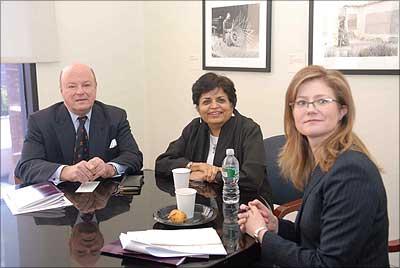 An Asia Society task force -- working on advancing relations between India and United States -- on Friday urged the incoming Barack Obama administration to pursue deeper collaboration with New Delhi for mutual benefits on a host of global challenges raging from security and economic growth to climate change, education and tackling HIV/AIDS.
An Asia Society task force -- working on advancing relations between India and United States -- on Friday urged the incoming Barack Obama administration to pursue deeper collaboration with New Delhi for mutual benefits on a host of global challenges raging from security and economic growth to climate change, education and tackling HIV/AIDS.
Releasing the task force's report at a press conference at the Asia Society in New York, former US envoy to India Frank Wisner said that the civilian nuclear agreement between the two countries demonstrated their willingness to explore inventive avenues to address global challenges.
"This task force wants to harness the energy of our two countries' private sectors, in public-private partnerships, focused on the big problems governments cannot solve alone," Wisner said.
He elaborated that the task force had analysed the bilateral relations in the last ten years and the members found that both sides achieved a degree of trust and understanding that has helped them get over decades of considerable strain.
'We have also seen the most irksome (bilateral) issue probably in modern history -- the nuclear question -- being settled with the completion of the 123 agreement. A number of institutions have been put in place and there is a wide variety of cooperation that exists today that did not exist before," Wisner said.
"We have to consolidate this relationship," Wisner, co-chair of the task force along with Charles T Kaye, former chairman of the US India Business Council, said.
The task force report outlines innovative proposals to utilise both countries' strategic strengths, particularly leveraging private sector engagement to tackle complex global issues. It outlines recommendations across two parallel tracts.
Track one focuses on strengthening governmental relations through securing India's leadership in multilateral institutions, expanding cooperation on economic growth and security initiatives, and fostering dialogue on the future of nuclear nonproliferation.
Tract two proposes joint public-private partnerships in areas including climate change, secondary and higher education, agricultural in India and HIV/AIDS.
Although Kaye was not present at the conference due to an emergency surgery, he said in a statement that the task force believes that India matters to virtually every major foreign policy challenge facing the United States in the years ahead.
"We are at a critical moment of positive upswing that the new administration must work concertedly to maintain. Our work is just beginning,' he said.
According to the report, a broad-based, close relationship with India will be necessary to solve complex global challenges, achieve security in the South Asian region, reestablish stability in the global economy and overcome the threat of violent Islamic radicalism that has taken roots across the region and in India.
"The members of the task force believe that America's relationship with India will be among our most important in the future, and will at long last reach its potential for global impact -- provided that strong leadership on both sides steer the way," it said.
The 11 members of the task force, besides Wisner and President of the Asia Society Vishakha Desai, include Marshall M Bouton, president, Chicago Council of Foreign Affairs; Stephen P Cohen, senior fellow Brookings Institution; Ambassador Teresita Schaffer, director, South Asia Program, Center for Strategic and International Studies; Ashley J Tellis, senior associate, Carnegie Endowment for International Peace and Desai.
The report also raised questions about the future of the Indo-US relationship.
"Can the US and India together take some of the most vexing challenges facing the world today, and improve the lives and security of their citizens in doing so," the report queried.
"Our answer is 'yes', but we must set broad yet realistic goals to be shared by both countries. This report offers goals towards that ambitious agenda for our shared future," it said.
Wisner said neither India nor the US can achieve all their goals and protect their economic interests without effective cooperation.
"You cannot achieve anything on the Doha round (of negotiations) or in climate change unless you have agreement between our two countries. Therefore, our cooperation needs to expand," he concluded.
Image: Former envoy to India Frank Wisner, President of Asia Society Dr Vishakha Desai and Task Force Director Dr Alyssa Ayres
Photograph: Paresh Gandhi






 © 2025
© 2025